#disabled academic
Explore tagged Tumblr posts
Text
Honestly, it’s been a pretty exhausting Pride Month.
I’ve had to deal with a lot of grief with how much disability, chronic illness and neurodivergence means that so much of Pride is just inaccessible to me and most of the community just isn’t bothered about that fact.
I’m not closeted to my parents but there’s this gulf where I don’t know how to even start discussing gender with them in a way that I can remotely convey how important it is to me to be nonbinary and what it really even *means*.
The fact that a UK general election is coming up and both of the “main” parties are vying with each other on how much they can oppress trans folk.
I’ve completed my Masters, which I’m really proud of myself for managing and proud of the research into disabled history I’ve produced, at a university which is actively empowering transphobes through the GCRN. And everything we’re doing to fight that is incredibly energy-sucking and mostly just gets actively ignored.
I’m so damn tired.
#im exhausted#chronic pain#chronic fatigue#disableism#trans#nonbinary#queer disabled#queer#disabled#grief#chronic illness#autistic adult#disability#uk politics#complex family stuff#uk general election#disabled academic
55 notes
·
View notes
Note
Update on this future dirtling spoonie's first semester. SoI just did my first final. It was English Somehow took a 2-3 paragraph assignment and ended up writing 4 pages😅🤦🏻♀️1 final down 3 to go plus finish up the last page of a 6 page research paper (technically page 5, but I ran out of motivation for that page and skipped ahead and did page 6.) Due tonight
Hey, congratulations! The end of the semester is a busy and stressful time, but I hope you're taking the opportunity to be really proud of yourself. You did this. I know you were nervous, and I'm sure there were moments when it was hard—this is an incredible achievement, and you should give yourself credit for that.

Cheers, -Reid
9 notes
·
View notes
Text
041623 | long overdue updates!
it has been quite a while since i last updated. i had a horrible first semester of grad school, and spent this semester really trying to fix that! i wen through the medical withdrawal process and managed to do well so far. one class is a pass/fail class which helps a lot, and the other one is an introductory class so it's not as rigorous. other than that, school is pretty steady now! i'm taking the summer off to hopefully work or do an internship for a little bit (:
i am set to take a normal course load next semester, which i hope i can keep up with. i'm going to keep in touch as often as i can and hopefully save up enough to get all my appointments done and get adequate paperwork for some disability accommodations next semester. thankfully, one class is synchronous online, and another class is only meeting in-person every other week! it really helps me to not have to leave the house every week and just be comfortable at home.
anyway, i'm updating my theme (the struggle to find a cute and functioning one) and about section a bit! the biggest edits were adding links to show the planner i am using for 2023 and that i started bullet journaling! i'm not too great at it, and it's really just a book of "trackers" (i track things like video game daily logins, medical stuff, and my mood) but i hope maybe next year i can add a sort of scrapbook component to it! also, i made a cute things side blog! :D
as for my personal updates, i'll put those under the cut!
i have been doing okay! health-wise, i am doing quite badly, and upgraded from a cane to a walker (everyone thinks it's unfortunately comedic, because for years i called myself a little old lady, and now i really resemble one!). i also got a platinum pass to seaworld because it is a really happy place for me lately (love to go through it at my own pace, watch some shows, eat some park food, and just in general sit around it lol).
i'm seeing two of my partners soon! they're coming to visit and we're going to have a lot of fun i hope! i have an awful complex about living where i do, so i'm trying very very hard to make their stay nice. it's hopefully going to help me power through finals and inspire me to save up to visit them in the summer/early autumn too.
some random thoughts to end this post: i'm loving two songs a lot right now, nmixx's love me like this and ive's i am. they're both different overall vibes but they are both so fun to me! i also have been playing a lot of virtual jigsaw puzzles and just finished two 1000+ piece ones, and starting a new one. i am really loving sticker-by-number books too! i'm currently doing a dog one and it's so cute!!
#kayos daily recap#graduate studies#student life#studying#graduate school#student#grad school#study tumblr#university blog#university student#university#academic#academics#disabled academic#student blog#new studyblog#new studyblr
3 notes
·
View notes
Text
The things about academia you should wholeheartedly criticize:
Ableism
Ageism
Racism/Ethnocentrism
Homo- and transphobia
Elitism within administration
Cost and accessibility
Support of AI in certain circles
Pay-to-use databases where academic papers are stored/sold by institutions
General bastardry
What you should definitely NOT criticize about academia:
The tireless work of academics to provide whatever information possible and improve the world's general understanding of itself.
Their pressure on the system to make that info accessible to the public.
you can discuss the problems within academia literally forever and you probably should but “historians are trying to keep information from you” is always going to be an anti-intellectual, reactionary opinion, sorry, literally no way around that
18K notes
·
View notes
Text
percy doing better than annabeth in college is one my favorite developments in the rrverse. if we reflect on percy and annabeth's academic upbringing. annabeth living at camp allowed her to receive accommodations for her adhd and dyslexia and surround herself with like-minded campers who had the same limitations. whereas percy was ridiculed, belittled, and routinely humiliated because of his adhd and dyslexia. even more so, percy's friends and family leave him out of the loop on so many important issue (no chb orientation film, no information about the great prophecy) which perpetuates his subpar confidence and self-esteem in his skills as a student and a demigod. but going to college at NRU changes his mindset because he receives the accommodations he should have gotten years ago and fucking thrives to the point of getting higher grades than annabeth — a person he deems way smarter and more prepared than him in every way. the most important thing percy is learning now is that a supportive environment makes all the difference, and he is more capable than he initially thought.
#in no way is this me trying to diminsh annabeth's struggles#because she canonically does#but she also has access to resources that accomdate her learning disabilities#whereas percy never did#even in an environment where demigods are supposed to be on equal footing because of their shared struggles#percy often gets the short end of the stick because no has properly prepared him for anything#he canonically has to figure shit out on his own and that pisses me offc#but nru gives him the accommodations and opportunity and environment to thrive#and he does so well that he earns higher grades than annabeth#somebody percy holds in high regard#this development proves percy and annabeth are canonically on par with each other academically and that they always were#what an amazing decision#percy jackon and the olympians#pjo text post#pjo#percy jackson#annabeth chase#percy getting higher grades than annabeth#loves this for him#he deserves to thrive in the mortal world and our boy is doing it
3K notes
·
View notes
Text
one of the things that I found particularly interesting in Demigods of Olympus is that it finally gives the best direct comparison we've seen so far between Percy and another character's experiences in terms of academics and particularly ableist discrimination.

The way Zane describes his experiences and what we see in his POV is that, while he is similarly discriminated against for his "atypical" behavior and blame is placed on him, the only sorts of punishments he receives for this are relatively benign, such as an increase in counseling. (It is also notable that Zane is somewhat autistic-coded, such as having the "incorrect" scripts when speaking with adults and Sam explicitly reminding him to remember to make proper eye contact.) Percy, on the other hand, similarly experiences discrimination for "atypical" behavior, but whereas Zane is treated as "too smart for his own good" and given slaps on the wrist, Percy is automatically labeled as aggressive, destructive, and a trouble-maker based on preconceived assumptions about him and is more severely punished, such as being frequently expelled.
We rarely get this level of direct comparison between Percy's experiences and that of another character, particularly such similar experiences, so looking at the differences is really interesting to gauge what their different experiences with ableist discrimination is like - and how it could potentially tie into intersectionality and other forms of discrimination at play for them.
For instance, Zane's parents are generally heavily implied to be middle-class and/or generally financially secure, versus Percy who grew up poor, so it could be classism in combination with ableist discrimination. Alternatively, it could be intersectionality with racial discrimination, as neurodivergent behavior in people of color is significantly more likely to be punished more severely and labeled as aggressive or disruptive behavior due to racist preconceptions - particularly since we know Percy's experiences with ableist discrimination are also somewhat based on assumptions people make regarding his appearance. Both Zane and Percy are racially ambiguous - Zane's appearance essentially being completely unspecified, but Percy at least having some notable details such as having a deep tan complexion. If not racism, it could also be colorism, which in this context often has similar intersectionality. There's a lot of potential options.
It's just very interesting to me! I love having such a direct point of comparison to examine the experiences of two characters within.
#pjo#demigods of olympus#riordanverse#percy jackson#zane carver#analysis#disability#adhd#one of my biggest gripes with analysis that i see often in the fandom is people erasing Percy's experiences with ableism#particularly academically and instead electing to frame his experiences as ''only possibly being from [x] - there's no other explanation''#which is really sad to me because it just highlights how little people understand what ableism and ableist discrimination look like#and simply seem unable to process our experiences and stories meant to reflect our experiences#so having another frame of reference to compare Percy's experiences against is REALLY nice and particularly fun for me personally#because it gives an opportunity to highlight both the general disabled experiences Percy faces due to his adhd/dyslexia#but also how that potentially ties in to intersectionality with other demographics he's a part of or may be a part of#because now we have a point of comparison between how two disabled characters are experiencing similar discrimination for the same thing#but there *are* differences between them in specific ways that potentially indicate something occurring in addition to just ableism#which is fascinating! and allows those discussions in the context of intersectionality WITHOUT erasing disabled experiences! yippee!!!#anyways this is mostly off the noggin since ive just been rotating the thought for a couple of days#chewing on this chewing on it chewing on it
130 notes
·
View notes
Text
USA students with disabilities and disorders: LISTEN UP!
In the USA, a huge issue has gone unnoticed by our government, despite the cries of my people. Since the creation and implementation of IEPs and 504s for students with disorders and disabilities in school systems, this problem has plagued school systems on a national scale.
‘What is this problem?’ Is what you may ask. Well, I shall tell you from my perspective (and other students) as a female who has autism, ADHD, and GAD.
The problem is that school systems are allowing staff to discriminate and ignore students with IEPs and 504s. When I was in 9th grade, I had an English teacher who wouldn’t follow my IEP, which is illegal to do. Even with my case manager and parents communicating to him that he had to follow my IEP, he wouldn’t listen and lied about his actions. My case manager reported him to the higher ups of the school and her supervisor, but they didn’t even reach out to him, nor did they ever get back to us.
I was warned by many students with IEPs about this English teacher, as they also experienced the same exact situation where he refused to follow their IEPs. He was (and likely still is) the only option for 9th grade English, besides the English class for those who may have things like dyslexia or those who struggle with English in general.
I could’ve taken him to court, unfortunately though, I only found that out after I moved schools.
The next year, in my new school, my new case manager ignored my concerns and refused to talk about making a few changes to my IEP. She brushed me off by saying that I would be fine.
I wasn’t fine.
I ended up switching to online school, where I would be at home, yet still receiving the proper education through online meetings and programs.
Those of us who are students with IEPs and disabilities or disorders, especially under the age of 18, are oppressed and our cries for help are ignored.
We are SUFFERING. IEPs are NOT a privilege, they are a NECESSITY for those of us who have it!
My best friend who also has an IEP keeps me updated on the happenings of the school I went to (the one with the English teacher mentioned in the first paragraph) about how those of us in special education or/and have IEPs are being treated.
I have researched and read of so many incidents and situations like mine.
There is a HORRIFYING amount of mistreatment of my community, my people, with disabilities, disorders, and IEPs among schools across the nation.
How could schools claim to treat everyone fairly and that consequences for discrimination will ensue, when the teachers are the ones who discriminate more than most of the students and get away with it?
We need to change, and we need to revolt against schools who let staff get away with discrimination of those of us with disabilities, disorders, and IEPs!
WE WILL NOT BE SILENCED! WE WILL FIGHT FOR OUR RIGHT TO EDUCATION!
To my dear readers, please share this post across social media platforms to spread the support we so desperately need. Please share this among family and friends, coworkers, and even teachers and school staff.
#disability#discrimination#school system#activism#activist#neurodiversity#oppression#academics#mental disorders#mistreatment#authority abuse#power abuse#protest#equality#student rights#public school#private school#IEP#504 plan#special education#please reblog#important#political#kamala harris#vote kamala#us politics
20 notes
·
View notes
Text
I love both Stan twins but fandom really takes the Filbrick way of thinking wrt how smart Stanley is
#bridget.txt#gravity falls#stanley pines#like. he taught himself phd level physics for 30 years with only Ford's books as a guide#he runs a successful business by conning people like his old man did#he tricked a being that can READ AND ENTER YOUR FUCKING MIND#he would've been mayor of Gravity Falls if they hadn't dug up his past#Stan is fucking creative and ingenious in ways that Ford isn't and had it slapped into his head for 60 years that he isn't smart#he might not be academically smart but he's SMART#as someone with a learning disability who struggles academically ilu Stan Pines
34 notes
·
View notes
Text
aro culture is celebrating, uplifting the voices of, and practicing advocacy with the disabled people in our lives this disability pride month.
#aro culture is#aro#aromantic#actually aro#actually aromantic#ask#mod phoenix#disability pride month#also a book recommendation for y'all: Academic Ableism: Disability and Higher Education by Jay Timothy Dolmage#it's somewhat USAmerican and Euro-centric due to... y'know... the general structure of Higher Education worldwide#but it's got a very informative and frank discussion right off the bat about eugenics and the very recent history of incredibly terrible#ableism in the last century that was only rejected in word and sorta in spirit when eugenics became a core ideological facet of nazis#highly recommend that if you live in an area where you have access to a library / library system#that you check if they have access to it - and if they don't: request it! - and read even the first two chapters
294 notes
·
View notes
Photo
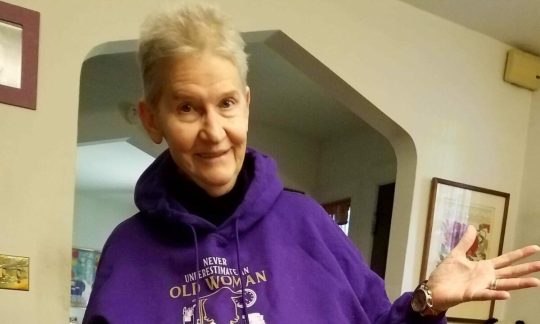
Barbara Kannapell (deceased)
Gender: Female
Sexuality: Lesbian
DOB: 14 September 1937
RIP: 11 August 2021
Ethnicity: White - American
Occupation: Activist, sociolinguist, academic
Note 1: First to promote bilingualism as an educational philosophy for the education of deaf students and helped legitimize American Sign Language. First deaf person at Georgetown University to earn a PhD. in sociolinguistics. So much more.
Note 2: Was deaf
#Barbara Kannapell#lgbt history#Sign Language#lgbt#lesbianism#female#lesbian#1937#rip#historical#white#activist#linguist#academic#first#deaf#disabled#popular#popular post
219 notes
·
View notes
Text
I’VE PASSED MY MASTER’S DEGREE! 🌈
36 notes
·
View notes
Note
So to make a long story semi short; during fall term a couple unknowing found a set of mastodon teeth and brought to my anthropology professor at the college, since then they conducted some field work and found more bone. They obviously stopped because of winter but in summer the college will be offering a field work class to go help at the site. I want to do that, but as mentioned before I have Cerebral Palsy which means I don't have a lot of upper body strength or flexibility. But I can still do a lot. My I guess problem is my Professors respect me and that's hard for me to get with all the ableism and I worked hard these last two semesters to break out of my shell to get here , I guess I just don't want to 1. make a fool of myself 2. be a hindrance and/or mess something up
any advice?
This sounds like an incredible opportunity, and I would definitely encourage you to pursue it! I hear your concerns about embarrassing yourself and being a hindrance, but I think you should reframe your thinking around facts that 1) everybody deserves learning experiences regardless of their physical ability, and 2) there are things you can do that will be an asset to the excavation.
Some of these things include taking notes and photographs, documenting and storing finds, and working with any digital tools like GPS units. You may also be able to do lab work and different kinds of analysis, depending on what they find and how they run the program. A good supervisor (although not all are created equal) will be willing to work with you to come up with a plan for how you can participate and what that will look like.
Usually, classes like this have applications where students list their relevant coursework and write a brief personal statement about why they want to participate. There are a couple of ways you could go about this in regards to disclosing your disability and seeking accommodations. You can either:
Disclose early: this would entail including something about your disability in your personal statement, in an email to the professor running the dig, etc.
Disclose later: submit your application without mentioning your disability. Feel free to mention how hard you've worked to get where you are, and if you want to talk about vague challenges with your health as part of that, it's up to you. If you are accepted to the dig, ask for a meeting with the supervisor where you can then explain your needs and what you are able to do.
Generally, I advise erring on the side of disclosing later rather than earlier. As I'm sure you're aware, prejudice and implicit bias are unfortunately a thing, and sometimes the only way to protect yourself from those impeding your application is to withhold information (although obviously this isn't an option if the professor already knows you). Additionally, you have legal protections against discrimination that are much easier to enforce after you have been accepted.
That being said, I've been heartened to see that more and more people in archaeology spaces are thinking about what accessibility means in field settings and how to include people with disabilities.—perhaps this is also the case with whoever is running this dig. Archaeology is for everyone, and there are many roles in an excavation for someone who can't do physical labor.
Finally, I'll close with some resources that might be helpful.
The Disabled Archaeologists Network: while I don't think they have a ton of programming for undergraduates (yet), membership is free and can put you in touch with
Field Tested: an article about a disabled student who was able to participate in a geology field school (similar levels of work to an archaeology one). It discusses some of the accommodations the student needed, and what they were able to do.
Here's an article by Dr. Anita Marshall, the professor who ran that accessible field school. Its content isn't substantially different from the one I linked above, but at the end it also cites some good literature about accessibility in field work. You should be able to access a lot of those publications through your institution's library or @jstor's free (or institutional) service.
Good luck, -Reid
#disabled archaeologist#archaeology advice#field school#he speaks#he answers#archaeology#academic advice
130 notes
·
View notes
Text


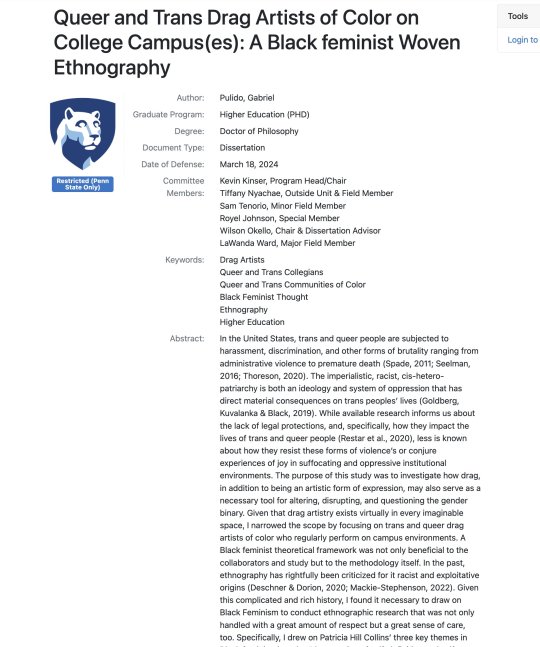
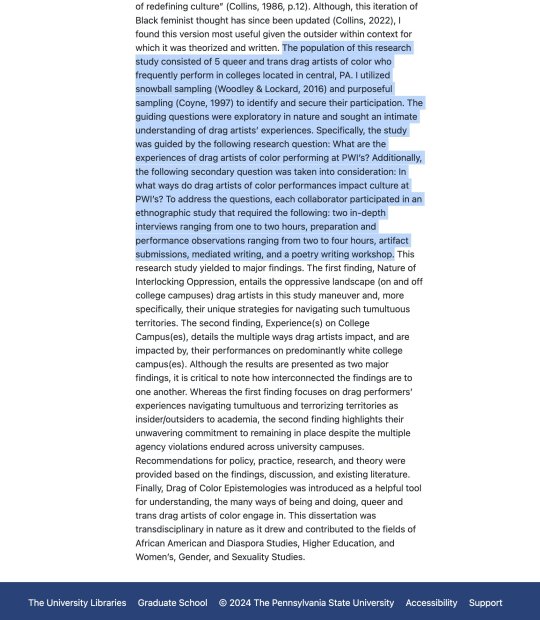
-

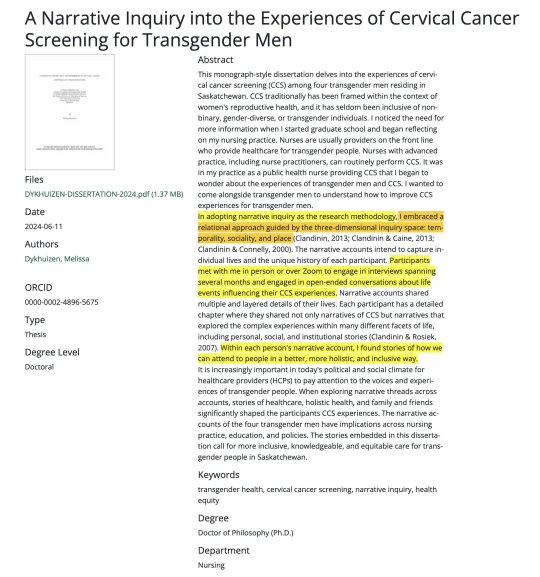
-

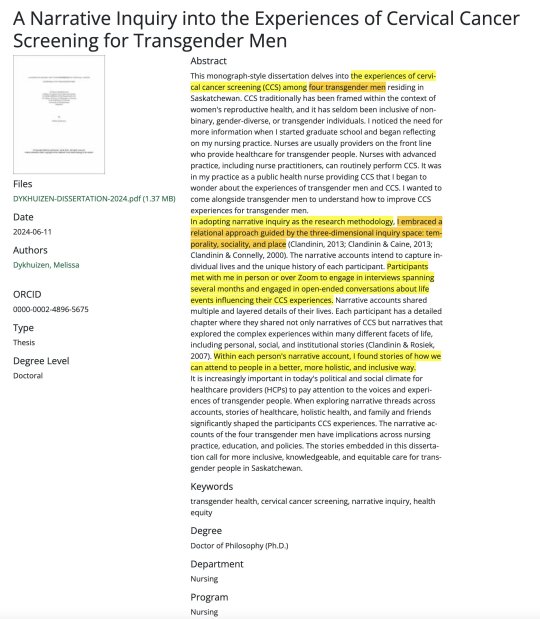
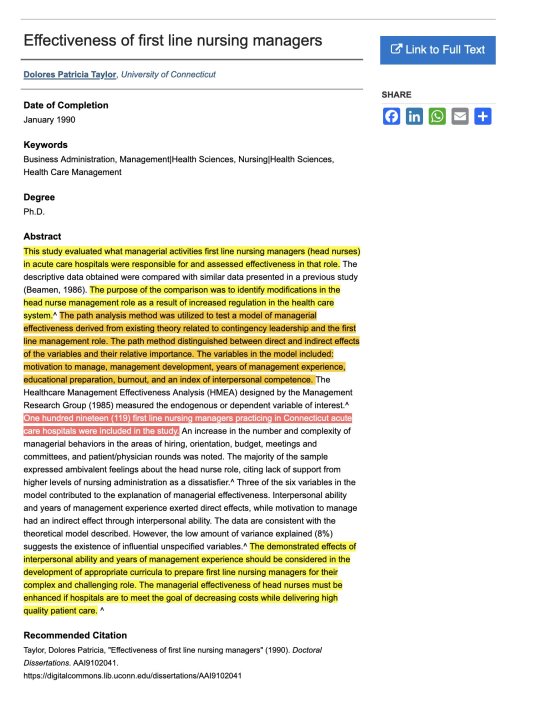





-

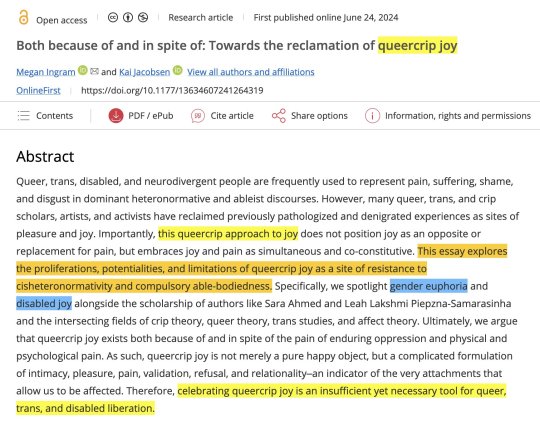
-

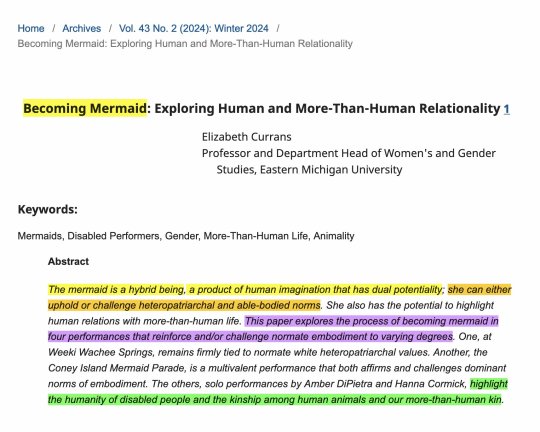
-

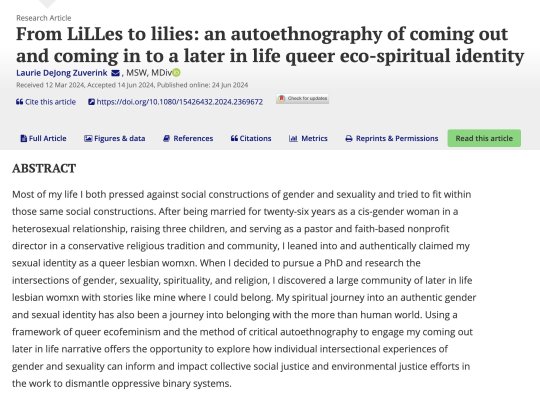

-

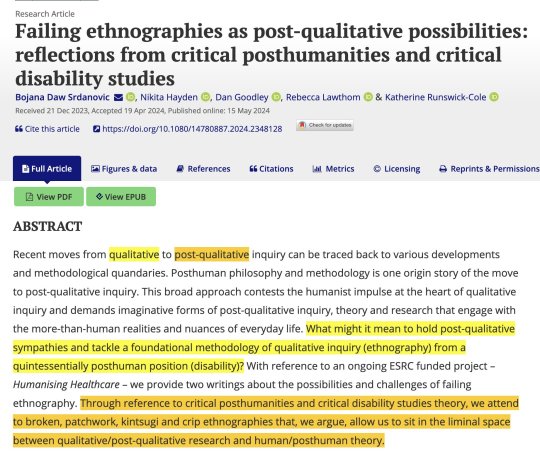
-

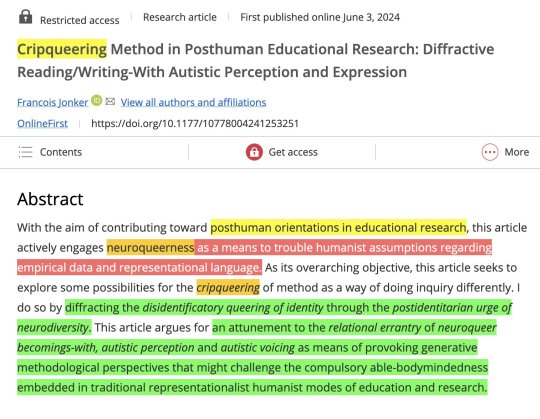

==
This might be funny if it wasn't pipelining pure toxic excrement into the waters of our knowledge-making institutions.
It's all fake. But now it's cited and treated as legitimate when it still isn't and never was. This is a form of corruption and fraud.
#Colin Wright#academic corruption#academic fraud#defund gender studies#gender studies#women's studies#scholarship#idea laundering#feminism#modern feminism#identity studies#disability studies#fat studies#heteropatriarchy#cisheteropatriarchy#cisheteronormativity#gender ideology#gender identity ideology#queer theory#queer studies#academic gibberish#academic jargon#word salad#academic nonsense#religion is a mental illness
30 notes
·
View notes
Text
(Very long post, sorry.)
I had an experience with a college professor last semester that really got me thinking about academics and ableism, specifically in college writing.
A few months ago, my class was having an open discussion, and I brought up an opinion that had been on my mind for a while.
I basically said, "There's a gap between college-level writing and the average person's reading level that we need to fill. Nobody should need to look up words every three seconds to understand a study that could affect their life, so we either need more people to rewrite these studies for the general public to understand, or these studies, in general, should be published with language that isn't so complicated."
My professor responded by saying something like, "Sure, that's a good goal. However, wouldn't a better goal be to raise the average person's reading level so that everyone can understand college-level writing?"
I (in my frantic and confused way) tried to bring up the fact that there are people born at a disadvantage in life. In fact, getting everyone to a perfect college reading level isn't a realistic goal. It certainly isn't for me, and I don't want it to have to be for other people. In fact, the professor who told me this also struggled to understand the chapters we were assigned to read in that class.
Really, it all comes down to this: college-level language is inaccessible.
Even more importantly, many people will never be able to understand most of the huge words thrown around in college writing.
At school, I am constantly told my writing style is "simple" and "easy to understand." This is something my classmates have told me isn't "bad" but just "different." However, I'm still insecure whenever someone mentions it because it is always pointed out. I use a smaller vocabulary, they seem to say, but don't worry. It's just a preferred writing style, they reassure me. They think the simple language is a choice I could stop at any time.
Well, what if it isn't just a "style"? What if I struggle to expand my vocabulary? Learning one new word takes me ages because I need to see it in all kinds of contexts. Even then, oftentimes "context clues" are no help, and I completely misinterpret the meaning of a word for years because it seems like every other native English speaker knew what it meant without needing to say it. A lot of the time I'll read the definition of a new word and instantly forget it after finishing the sentence it was in.
So yeah, I'll say it with pride: Simple words are powerful. Simple words are beautiful. And most importantly, simple words are not inferior in any way to words like "quintessential" or "expedient." (I have no idea what either of those words mean even though I've looked them up plenty of times and used them accurately in essays before.)
Simplicity is why I like shows meant for all ages better than shows meant only for adults. Because in shows that are written with children in mind, there aren't confusing messages you have to spend energy untangling. There aren't unnecessary analogies or feelings that are "implied" but never said. The characters' facial expressions and emotions are easy to read and the moments where I am confused are rare.
Now, this is all coming from an autistic person with low support needs. My reading comprehension score is considered slightly above average, and so is my problem-solving abilities which means I am lucky and I can understand a lot of what I read in college. The main point of this little "essay" was to point out a common conversation I despise hearing in college, the one about simple language and its implied inferiority.
Because guess what? Language is not accessible to everybody. Many of us, even those with high reading comprehension, struggle.
Our goal should never be to make everyone capable of reading college-level books and studies. That is asking for those who need accommodations to accommodate themselves, something I'm sure other disabled people are tired of having to do. Instead, the goal should be making college language more accessible, making knowledge accessible. After all, the reader is only a fragment of the conversation. The writer is the majority of it.
TLDR; Everyone deserves access to language and knowledge that makes sense, and bigger words never mean they are better.
#actually autistic#ableism#autism pride#autism awareness#actuallyautistic#autism#asd#learning disability#accessibility#disability#college#academics#university#student#autistic spectrum#autistic#autism spectrum disorder#autism spectrum#tw ableism
303 notes
·
View notes
Note
hey! I'm currently writing a paper discussing experiences of disabled and neurodivergent students at my uni (spoiler alert: it's not great lmao), and while I have a couple references so far (mostly Lund and Pearlstein) about the larger Disabled Student ExperienceTM I'm struggling to find academic papers talking about this, particularly since my field of study is psychology rather than disability theory/disability justice. are there any texts regarding this that you would reccommend? doing my best to lean on crip theory for this essay and you were the first person i thought of! no worries if you don't have the energy to answer this rn ofc, i hope you're having a good day ✨
omg what a fabulous & vital project! i’d love to hear more about your work both out of interest & to potentially refine my recommendations because this is such a complex, multifaceted area of experience + research + activism — i tried to draw from a variety of perspectives so you can dig deeper into what seems most relevant!
my number one recommendation is the book Academic Ableism by Jay Dolmage, i still need to read most of it rip but it’s absolutely considered foundational in this topic. the rest i’m gonna put under a cut because it got super long lol, i’ll also reblog to my disability sideblog @crippleprophet in case anyone else has suggestions!
best of luck with your work, i hope some of this is helpful! feel free to reach out for more recommendations, input, or encouragement❣️💖
on the built environment – eg, the physical campus & how it impacts students
if you’re in the US, this summary of colleges’ responsibilities under the ADA has been helpful for me (link).
Building Access by Aimi Hamraie
Accessibility for Historic Buildings: A Field Guide, 2nd Edition (link to pdf)
written by David Provost and revised by Joseph Hoefferle, Jr. as part of the University of Vermont Graduate Program in Historic Preservation
back in 2020 i used the first edition of this document in a project arguing my undergraduate university should make its historic buildings more accessible
lays out policies & options in tables with photo examples from their campus
Aimi Hamraie & Kelly Fritsch’s Crip Technoscience Manifesto (2019)
Catalyst: Feminism, Theory, Technoscience, 5(1), pp1-34.
this piece is honestly just incredibly life-giving for me in general so i highly recommend giving it a full read when you have time. specific parts that i thought might resonate with the experiences of students at your uni:
“user-initiated design” (Hendren & Lynch, cited p9)
“access as friction” (p10):
Emerging out of historical fights for disability rights, the terms accessibility and access are usually taken to mean disabled inclusion and assimilation into normative able-bodied relations and built environments. […] However, the etymology of the word access reveals two frictional meanings: access as “an opportunity enabling contact,” as well as “a kind of attack” (2016, p. 23). Taking access as a kind of attack reveals access-making as a site of political friction and contestation. While historically central to the fights for disability access, crip technoscience is nevertheless committed to pushing beyond liberal and assimilation-based approaches to accessibility, which emphasize inclusion in mainstream society, to pursue access as friction, particularly paying attention to access-making as disabled peoples’ acts of non-compliance and protest.
noncompliant users and assistive technology as friction (p11):
Lifchez and Winslow offer the concept of “non-compliant users,” illustrating this with an image of a powerchair user wheeling against traffic on a street without curb cuts (1979, p. 153). This technology-enabled movement against the flow of traffic marks anti-assimilationist crip mobility: not an attempt to integrate (as in the liberal approach to disability rights), but rather to use technology as a friction against an inaccessible environment.
collaborative mapping of (in)accessibility, something i know happens more informally among disabled students on many campuses (p15):
Unlike mainstream disability technoscience “crowdsourcing” projects, which invoke a charity model of disability wherein non-disabled people collect data but do not engage in disability culture or politics, emerging projects such as Mapping Access are making participatory access-making the basis of a kind of technoscientific “access intimacy” (Mingus, 2017) through practices such as “critical crowdsourcing” of accessibility data (Hamraie, 2018). […] Collaborative mapping visualizes the evidence of inaccessibility while creating opportunities for collective response. Crip cartographic technoscience thus enables more critical design, and interrogation of the everyday built environment.
access to education
the United Nations Convention on the Rights of Persons with Disabilities includes the right to inclusive education (Article 24). scholarship in this area is about primary & secondary education, not postsecondary / university education, but a lot of the concepts can be applied
in addition to inclusive education, “universal design for learning” (UDL) might be a helpful keyword but it definitely trends toward the liberal as a whole
“Hidden contradictions and conditionality: conceptualisations of inclusive education in international human rights law” (2013) by Bronagh Byrne (link)
references the importance of identifying barriers as a step in the process of accessible education, which depending on your work may be a nice succinct justification of its necessity (p234):
Inclusion ‘necessitates the removal of the material, ideological, political and economic barriers that legitimate and reproduce in equality and discrimination in the lives of disabled people’ (Barton and Armstrong 2001, 214). According to this view, an identification of barriers within the school’s environment, teaching and learning strategies, and attitudes that prevent the full participation of children with disabilities, will also be required.
argues for a focus on inability of schools to meet students’ needs rather than students’ inability to conform to an ableist environment (for example, p242):
International human rights law has conditionalised the right to inclusive education for children with disabilities by making inclusion contingent upon the extent of individual rather than institutional or structural deficits.
psychological/emotional impact on disabled students
“psycho-emotional disablism” may be a useful search term for you, with the disclaimer that a substantial portion of scholars in feminist disability studies are TERFs / express “gender critical” beliefs / etc. so like i’m listing one paper i came across that looked relevant + two from my grad program’s recommended reading, but i haven’t read these & suggest vetting authors before citing them:
“The psycho-emotionally disabling impact of academic landscapes of exclusion: experiences of a disabled postgraduate in perpetual lockdown” (2023) by Joanne Hunt (link)
Reeve, D (2004). Psycho-emotional dimensions of disability and the social model. In C Barnes & G Mercer (eds), Implementing the social model of disability: theory and research. The Disability Press, Leeds, pp. 83-100. http://donnareeve.co.uk/wp-content/uploads/2014/03/ReeveChapter2004b.pdf
Reeve, D. (2014) 'Psycho-emotional disablism and internalised oppression', in J. Swain, S. French, C. Barnes and C. Thomas (eds) Disabling Barriers - Enabling Environments, 3rd Edition, London: Sage, pp. 92-98. http://donnareeve.co.uk/wp-content/uploads/2014/03/ReeveChapter2014a.pdf
29 notes
·
View notes
Text
slowly losing my mind thinking abt how much the modern world hates elderly/poor people. why must we have phones/tech to even know there are discounts on food, which are now unavailable in any physical means. why is it a standard expectation to be able to pull out your phone & call someone if you're in danger/hurt. where are the public phones. and even if they do have technology, they're often unused to it; so whatever made people in charge of tech companies think it was fine to use that opportunity to take their personal information because they don't know how to turn it off, or if the spyware is even there. it's terrible
#i have to take my grandmothers' phones and disable the invasive implemented parts of it for them. so they don't get scammed Again#it's horrendous. with the money my lola lost in particular; could've treated herself to a god damn catering hall for her next birthday#idk. even in academic settings if you don't have convenience of personal technology you're fucked#there's more to be said but i'm not coherent enough atm. nap time for me#jestersvaguely#negative
26 notes
·
View notes